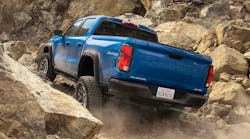Manager: Kenneth Burkett
Title: President
Fleet: American Waste Control, Tulsa, OK
Operation: Commercial refuse collection fleet
PROBLEM
Ken Burkett will tell you that uptime is everything in the trash-hauling business: If the trucks aren't on the road picking up garbage, you're not making money. “Equipment is your main tool in this business,” he says. “It's what you provide customer service with.”
A baker by trade, Burkett turned to refuse hauling to make a living in 1970 with a 16-yard packer mounted on a 1958 Ford truck chassis. After picking up trash on residential routes in Tulsa for 10 years, he decided to try the commercial side of the business. Burkett founded American Waste Control, which has since expanded from two to 70 vehicles, including front and rear loaders and dumpster-hauling roll-off trucks, serving all of Tulsa and towns within a 75-mi. radius.
Specializing in hauling industrial and commercial waste, Burkett's company owns and operates its own landfill, and a recycling and trash transfer facility. Burkett says that in addition to a dedicated workforce, the key to keeping his business thriving is the equipment. “We just can't afford them to be down because we have…only six or seven spare trucks,” he points out. “That's why maintenance…is so critical.”
“Preventive maintenance is the key to running a successful and efficient fleet,” explains Mario Ondarza, service foreman. “Major problems can be avoided [if] you change your oil on a regular schedule and take care of the minor issues before they escalate.”
Refuse operations are one of the most volatile conditions an engine can be exposed to, with dusty environments, frequent stop and go, high idle time, and reverse driving putting a lot of stress on the oil. Although service and inspections are performed every 250 driving hours by both drivers and maintenance crew, Ondarza needed additional ways to spot small problems before they become big ones.
SOLUTION
Ondarza discovered that an oil analysis program could serve just this purpose. American Waste Control uses a program run by its ConocoPhillips distributor, Rambin Petroleum.
Oil samples are collected at each 250-hour inspection interval and sent to a local lab for analysis. The analysis can detect component wear and contamination levels in transmissions, hydraulics, differential and final drives, as well as other components that might not be visible to the naked eye. This helps the fleet identify problems and fix them before they sideline the vehicles.
In addition, Ondarza says the data helps him monitor engine oil drain intervals, so he gets the most efficient and cost effective performance from his oil.
Making sure he can safely extend his drains is critical, as the company changes engine oil every two to three weeks, going through about 18,000 gallons of oil a year.
Finally, Burkett mentions that having all this data helps out tremendously when it comes time to sell the trucks. “Many of the oil fields in Oklahoma buy our old trucks and reuse them in the field or use their parts in repairs,” he says. “They know they can rely on our trucks to be in great condition because we take such good care of them. And we have the data to prove it. The oil analysis history really helps us when we go to sell.”
Maintenance Bay presents case studies detailing how fleets resolve maintenance-related issues.


